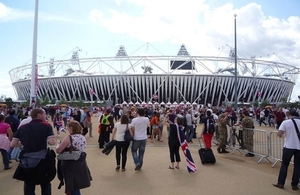No increase in alcohol-related illness during London 2012
A new report has been published one year on from the London 2012 Olympic and Paralympic Games.

Crowds gather outside the Olympic stadium
The report published by Public Health England (PHE) and the Centre for Public Health (CPH) at Liverpool John Moores University has shown that the Games had a minimal impact on alcohol-related harm above and beyond any on-going trends in London.
It was anticipated that hosting the Games would bring great potential for health improvement with much expectation on a healthy Olympic legacy. However, alcohol-related attendances at emergency departments can increase during national celebrations and major sporting events and there was a real concern that emergency departments may have been overrun during the Games.
In an effort to reduce the likelihood of this, public health interventions were planned in London to reduce alcohol-related illness and injury. These interventions included strict alcohol policies for Olympic-related events, restricted advertising, controlled pricing strategies, and appropriate public sector service planning. Whilst it is unclear precisely which interventions contributed to the success of the Games in preventing increases in alcohol-related harm, public health knowledge suggests these interventions would have played an important role.
Michela Morleo, Alcohol Research Manager at the CPH, said:
To date, much of the literature on the impact of mass sporting events on public health has related to countries outside the UK. This is the first time such an in-depth report has been published on the impact of a large sporting event in this country. The findings can be used in the future to support the use of interventions such as restricted advertising and controlled pricing strategies in event planning, both in the UK and abroad.
Dr Yvonne Doyle, regional director for PHE London, said:
It is great news that the London 2012 Olympic and Paralympic Games had a minimal impact on alcohol-related harm and Londoners were able to enjoy themselves healthily. It is very encouraging to see that, by using evidence-based interventions, we can have a real positive impact on reducing alcohol-related illness and injury during large international events.
The outcomes of this report will inform future major event planning in London, the UK and elsewhere. The Games have provided a legacy by demonstrating that an international sporting event can be delivered successfully without an overarching impact on healthcare service demand above and beyond any on-going trends.
The PHE London alcohol and drugs team will be building on a range of best practice through their work with local London partnerships, over the coming months and years, which will aim to further mitigate the impact of alcohol and drug misuse for the people of London.
Ends
Notes to editors
-
Public Health England’s mission is to protect and improve the nation’s health and to address inequalities through working with national and local government, the NHS, industry and the voluntary and community sector. PHE is an operationally autonomous executive agency of the Department of Health. www.gov.uk/phe Follow us on Twitter @PHE_London
-
The full report - The Impact of London 2012 Olympic and Paralympic Games on Alcohol-Related Illness and Injury is available from the CPH website.
-
For drug and alcohol resources and contact information visit the National Treatment Agency website.
Photo by Rambler1977 on Flickr. Used under creative commons license.